|
|
|
Sort Order |
|
|
|
Items / Page
|
|
|
|
|
|
|
| Srl | Item |
| 1 |
ID:
128195


|
|
|
|
|
| Publication |
2013.
|
| Summary/Abstract |
Future Track II activities might concentrate on the level of domestic politics, including empowering civil society movements as the rising agents of change.
|
|
|
|
|
|
|
|
|
|
|
|
|
|
|
|
| 2 |
ID:
072790
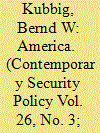

|
|
|
|
|
| Publication |
2005.
|
| Summary/Abstract |
This article traces the development of the post-Cold War American discourse on ballistic missile defences from its arms control supportive stance during the first Clinton administration to the abandonment of the ABM Treaty in 2002. It shows how military primacy and the absence of a peer competitor enabled conservative opponents of the ABM Treaty to change the discourse on National Missile Defense. Especially after the landslide victory of the Republicans in the 1994 congressional elections, national missile defence became politically driven, reducing the influence of more moderate forces on the debate. The 1998 Rumsfeld Report and the missile test by North Korea in the same year led to the Senate vote in 1999 to go ahead with a national missile shield. Neoconservatives dominated the agenda and the ABM Treaty was doomed. The article concludes with a review of the current missile defence testing programme. It suggests that contrary to the expectation of realizing post-Cold War primacy, the limits of technology have put more formidable shackles on American unilateralism than the constraints of the ABM Treaty Neoconservatives thought to escape from.
|
|
|
|
|
|
|
|
|
|
|
|
|
|
|
|
| 3 |
ID:
047751


|
|
|
|
|
| Publication |
Frankfurt, Peace Research Institute frankfurt, 2001.
|
| Description |
58p.
|
| Series |
PRIF Research Report
|
| Standard Number |
3933293421
|
|
|
|
|
|
|
|
|
|
|
|
Copies: C:1/I:0,R:0,Q:0
Circulation
| Accession# | Call# | Current Location | Status | Policy | Location |
| 043960 | 358.170973/KUB 043960 | Main | On Shelf | General | |
|
|
|
|
| 4 |
ID:
048476
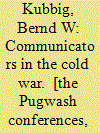

|
|
|
|
|
| Publication |
Frankfurt, Peace Research Institute frankfurt, 1996.
|
| Description |
56p.
|
| Series |
PRIF reports; no.44
|
| Standard Number |
3928965786
|
|
|
|
|
|
|
|
|
|
|
|
Copies: C:1/I:0,R:0,Q:0
Circulation
| Accession# | Call# | Current Location | Status | Policy | Location |
| 041464 | 327.16/KUB 041464 | Main | On Shelf | General | |
|
|
|
|
| 5 |
ID:
072789
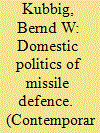

|
|
|
|
|
| Publication |
2005.
|
| Summary/Abstract |
Now that the bilateral perspective of the missile defence issue has become obsolete, its multinational character has more clearly come to the surface. The analyses of this Special Issue deal with the domestic politics of missile defence policy in 16 democratic countries. Among the nine key findings developed here are: the termination of the ABM Treaty has been grudgingly accepted, or cautiously welcomed, with greatest resentments alive in Russia; the United States' territorial shield has strong supporters, but is not broadly legitimized; almost all democracies share a consensus on Theatre Missile Defence for protection of expeditionary forces; the United States is the dominant power structuring the entire missile defence area, although America with all its influence is a necessary albeit not a sufficient factor in explaining the missile defence policies of other democracies. The contributors add three major explanatory factors: the broad foreign policy orientation or political culture, domestic politics and structure, and to a lesser extent the threat perception of the individual democracies.
|
|
|
|
|
|
|
|
|
|
|
|
|
|
|
|
| 6 |
ID:
090685
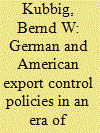

|
|
|
|
|
| Publication |
Kingston, Queen's University, 1993.
|
| Description |
ix, 77p.
|
| Series |
Martello papers; no. 4
|
|
|
|
|
|
|
|
|
|
|
|
Copies: C:1/I:0,R:0,Q:0
Circulation
| Accession# | Call# | Current Location | Status | Policy | Location |
| 034935 | 382.64/KUB 034935 | Main | On Shelf | General | |
|
|
|
|
| 7 |
ID:
072804
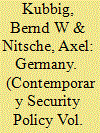

|
|
|
|
|
| Publication |
2005.
|
| Summary/Abstract |
From 1998 until it ended in 2005, the Social Democratic-Green coalition government rejected an explicit position on the necessity of a global or regional European shield, signalling scepticism towards such plans. At the same time the Schröder/Fischer cabinet, after an intense debate, was in favour of developing the tripartite MEADS system for the protection of soldiers deployed in out-of-area activities. The major missile defence-related issues examined in this article suggest that the changing identity of Germany as a trading power is in the final analysis the most credible explanation for these choices. In accordance with its greater stress on being a politically sovereign/more assertive country, the Federal Republic of Germany mutated during the Schröder/Fischer era from being a reluctant exporter of security to being a selective one. With this important exception, the missile defence-related decisions made in the Schröder/Fischer era do not support the conclusion that missile defence in general has become a stable and important element of the self-understanding of Germany and of its foreign policy.
|
|
|
|
|
|
|
|
|
|
|
|
|
|
|
|
| 8 |
ID:
048467
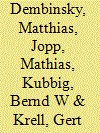

|
|
|
|
|
| Publication |
Frankfurt, Peace Research Institute frankfurt, 1989.
|
| Description |
81p.
|
| Series |
PRIF reports; no. 6-7
|
| Standard Number |
3926197544
|
|
|
|
|
|
|
|
|
|
|
|
Copies: C:1/I:0,R:0,Q:0
Circulation
| Accession# | Call# | Current Location | Status | Policy | Location |
| 041429 | 358.1752/DEM 041429 | Main | On Shelf | General | |
|
|
|
|
| 9 |
ID:
058612
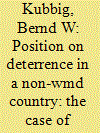

|
|
|
| 10 |
ID:
047661


|
|
|
|
|
| Publication |
Frankfurt, Peace Research Institute frankfurt, 2000.
|
| Description |
iv, 25p.
|
| Series |
PRIF Reports; no.56
|
| Standard Number |
3933293367
|
|
|
|
|
|
|
|
|
|
|
|
Copies: C:2/I:0,R:0,Q:0
Circulation
| Accession# | Call# | Current Location | Status | Policy | Location |
| 043547 | 358.17/KUB 043547 | Main | On Shelf | General | |
| 043609 | 358.17/KUB 043609 | Main | On Shelf | General | |
|
|
|
|
|
|
|
|
|